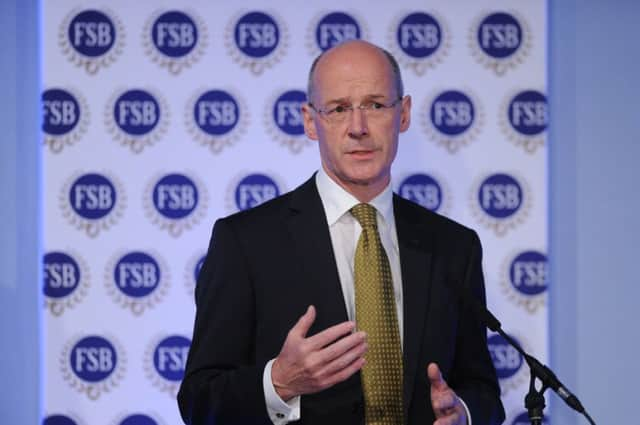‘Financial sector loss after Yes could cost £9bn’


Independence supporters have severely underestimated the economic risks of leaving the UK, with an overall black hole of £13 billion in Scotland’s public finances, according to a report from the Centre for Policy Studies (CPS).
A spokesman for Scottish Finance Secretary John Swinney last night rejected the report and said it was “little surprise that a think tank co-founded by Margaret Thatcher is against an independent Scotland”.
Advertisement
Hide AdAdvertisement
Hide AdThe group’s report, Why Scots Should Say No, says an independent Scotland would face three major risks – declining oil revenues, the flight of financial institutions and a higher cost of public pensions. It suggests North Sea revenue for the Scottish Government would fall from £10.1 billion in 2011-12, but only £5.5bn in 2013-14, to £3.7bn in 2016-17 – £3.2bn adrift of the £6.9bn predicted by the Yes campaign. However, the think tank identified the departure of banking giants such as the Royal Bank of Scotland, Clydesdale and Standard Life, which last week suggested they could register in England after a Yes vote, as the main economic risk.
The report talked about the likely flight of a large proportion of the financial services sector from Scotland, which the authors of the study said could leave revenues of £47.7 billion in 2016-17, excluding North Sea oil, which is about £9.2 billion lower than the £57.3 billion forecast by nationalists.
It added that rising costs of public sector pensions would be “likely to impose significant pressures on a Scottish budget already straitened by declining oil revenues and the probable haemorrhaging of tax revenues from financial services”.
The centre-right think tank said the impact is estimated at £1.1 billion in 2015-16.
The report said: “Together, omission of these three factors results in a severe understatement of independence risk, both to Scots in general and to public sector workers and retirees in particular.
“The cumulative impact of these three risks on Scottish government revenues would be £13.8bn in 2015-16. Total government revenues could be £50.4bn, far below the ‘Yes’ campaign’s own estimate (£64.2bn) and far lower, too, than the £63.3bn that Scotland is expected to spend in that year.
“The probable flight of a large proportion of the financial services sector from Scotland could leave 2016-17 ex-North Sea revenues of £47.7bn about £9.2bn lower than has been forecast by advocates of independence – £57.3bn.”
Advertisement
Hide AdAdvertisement
Hide AdScotland finance secretary John Swinney’s spokesman said: “This report is stuffed full of basic factual errors.
“Revenue figures for Scotland only take account of banks’ activity in Scotland, and the banks have confirmed that there is no question of jobs or operations moving – just brass plaques if anything – which is another fundamental flaw in the claims.
“In fact the only part of this report that is accurate is the importance of Scotland’s oil to the strength of the pound, which is exactly why the UK Government will agree to a currency union with Scotland.”
SEE ALSO